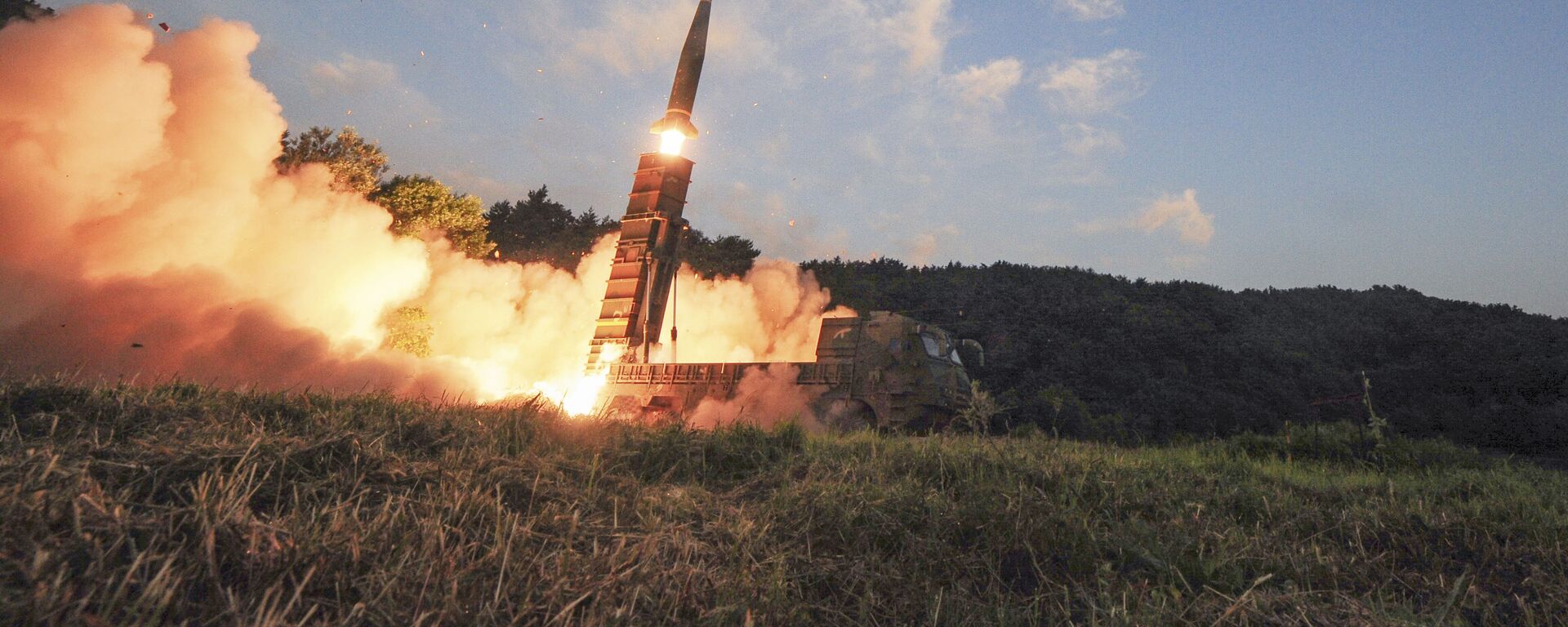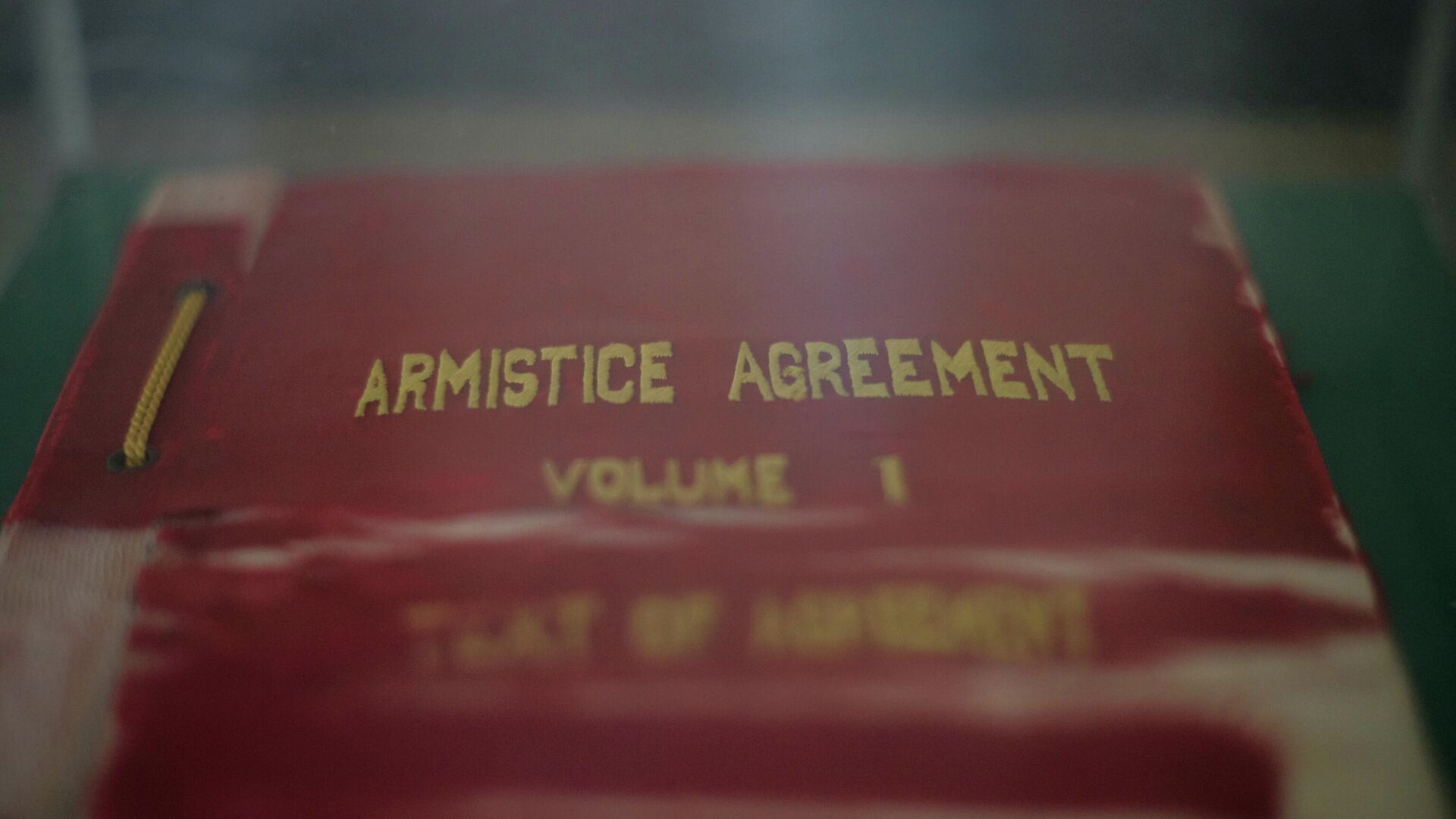https://sputnikglobe.com/20211208/house-gop-threaten-disastrous-consequences-if-us-removes-troops-before-dprk-denuclearises---report-1091337499.html
House GOP Threaten 'Disastrous Consequences' if US Removes Troops Before DPRK Denuclearises - Report
House GOP Threaten 'Disastrous Consequences' if US Removes Troops Before DPRK Denuclearises - Report
Sputnik International
The development follows reports that South Korea and the US have been trying to resolve the decades-long conflict on the Korean Peninsula. Nevertheless, there... 08.12.2021, Sputnik International
2021-12-08T04:33+0000
2021-12-08T04:33+0000
2023-09-18T13:36+0000
us
missiles
republicans
denuclearization
nuclear weapons
missile tests
us house
korean war
north korea
https://cdn1.img.sputnikglobe.com/img/07e5/0c/08/1091337946_0:69:3069:1795_1920x0_80_0_0_db9860ace5b3d3d5553bb9ef863da685.jpg
House Republicans demand that North Korean leader Kim Jong-un agree to denuclearise before the Democratic People's Republic of Korea (DPRK) and South Korea strike a peace agreement, after which the US is slated to withdraw its troops from the peninsula, Fox News reported on Tuesday.A list of 35 Republican House members, led by Representative Young Kim of California, wrote to White House National Security Advisor Jake Sullivan, arguing that a declaration to formally end the 70-year war might jeopardise regional security if a nuclear agreement is not reached before that.According to the report, despite that the alleged preparation of the peace treaty being kept secret, the administration spokesman said that the White House is "prepared to engage in diplomacy with DPRK".But Republicans reportedly claimed that even if the DPRK agreed to a nuclear accord, diplomatic relations with North Korea are too shaky to trust that it would be followed."There is no historical precedent to support the theory that the Kim regime would abide by the terms of a peace agreement," they stressed. "The DPRK has repeatedly violated binding agreements with South Korea, the US, and the United Nations, and continues to engage in illegal activity to skirt sanctions on its nuclear weapons programme and egregious human rights abuses."According to the letter, allowing for the possibility of removing US forces from the Korean Peninsula before the North has fully denuclearised "would have disastrous consequences for US national security, erode our combined deterrence, and jeopardise the lives of tens of millions of Americans, Koreans, and Japanese".Rep. Kim, who grew up in South Korea following the Korean War, repeatedly claimed that the Biden administration's efforts to establish diplomatic relations with the DPRK were useless.She also claimed that the formal peace might "cede the negotiating leverage of the United States, South Korea and our allies to the Kim regime".All in all, Kim's fellow members of congress are concerned that ending the conflict would give North Korea leverage to demand the departure of all US troops from the region, thereby destroying a deterrence force for not only the DPRK, but also China and Russia.The Korean War was fought between the North and the South from 25 June, 1950, until 27 July 1953. The US fought on the side of South Korea under the auspices of a UN operation, and the war eventually led to a roughly equal division of Korean territory along the 38-parallel, culminating in an armistice in 1953.
https://sputnikglobe.com/20211201/dprks-new-nukes--missiles-force-us-south-korea-to-rethink-war-plans---report-1091184161.html
https://sputnikglobe.com/20210925/north-korea-ready-for-talks-with-south-on-ending-71-year-state-of-war-1089408823.html
north korea
Sputnik International
feedback@sputniknews.com
+74956456601
MIA „Rossiya Segodnya“
2021
News
en_EN
Sputnik International
feedback@sputniknews.com
+74956456601
MIA „Rossiya Segodnya“
Sputnik International
feedback@sputniknews.com
+74956456601
MIA „Rossiya Segodnya“
korean war, north korea, nuclear weapons, house republicans, peace treaty
korean war, north korea, nuclear weapons, house republicans, peace treaty
House GOP Threaten 'Disastrous Consequences' if US Removes Troops Before DPRK Denuclearises - Report
04:33 GMT 08.12.2021 (Updated: 13:36 GMT 18.09.2023) Kirill Kurevlev
Managing Editor
The development follows reports that South Korea and the US have been trying to resolve the decades-long conflict on the Korean Peninsula. Nevertheless, there was no official confirmation of the formal peace treaty being under development and whether the accord will include wording pertaining to denuclearisation.
House Republicans demand that North Korean leader Kim Jong-un agree to denuclearise before the Democratic People's Republic of Korea (DPRK) and South Korea strike a peace agreement, after which the US is slated to withdraw its troops from the peninsula,
Fox News reported on Tuesday.
A list of 35 Republican House members, led by Representative Young Kim of California, wrote to White House National Security Advisor Jake Sullivan, arguing that a declaration to formally end the 70-year war might jeopardise regional security if a nuclear agreement is not reached before that.
"We are gravely concerned that this declaration, instead of promoting peace, would seriously undermine and destabilise the security of the Korean peninsula," the GOP legislators wrote, as quoted in the report. "Arguments in favour of the declaration as a means of bringing North Korea back to the table for negotiation have fallen on deaf ears in Pyongyang."
According to the report, despite that the alleged preparation of the peace treaty being kept secret, the administration spokesman said that the White House is "prepared to engage in diplomacy with DPRK".
"The United States remains committed to achieving lasting peace on the Korean Peninsula through dialogue and diplomacy," he is quoted as saying.
But Republicans reportedly claimed that even if the DPRK agreed to a nuclear accord, diplomatic relations with North Korea are too shaky to trust that it would be followed.
"There is no historical precedent to support the theory that the Kim regime would abide by the terms of a peace agreement," they stressed. "The DPRK has repeatedly violated binding agreements with South Korea, the US, and the United Nations, and continues to engage in illegal activity to skirt sanctions on its nuclear weapons programme and egregious human rights abuses." 
1 December 2021, 21:37 GMT
According to the letter, allowing for the possibility of removing US forces from the Korean Peninsula before the North has fully denuclearised "would
have disastrous consequences for US national security, erode our combined deterrence, and jeopardise the lives of tens of millions of Americans, Koreans, and Japanese".
Rep. Kim, who grew up in South Korea following the Korean War, repeatedly claimed that the Biden administration's efforts to establish diplomatic relations with the DPRK were useless.
"Kim Jong-un has proven time and time again to be an unreliable negotiator, and we must realise we’re dealing with a regime that cannot be trusted," she told the outlet.
She also claimed that the formal peace might "cede the negotiating leverage of the United States, South Korea and our allies to the Kim regime".
All in all, Kim's fellow members of congress are concerned that ending the conflict would give North Korea leverage to demand the departure of all US troops from the region, thereby destroying a deterrence force for not only the DPRK, but also China and Russia.
"Declaring an end to hostilities should come at the culmination of comprehensive and long-term talks with North Korea after eliminating its nuclear arsenal and demonstrating verifiable improvements on its human rights record," lawmakers concluded. "It should not be offered as an attempt to initiate talks with an uncertain endgame and strategy."

25 September 2021, 21:09 GMT
The Korean War was fought between the North and the South from 25 June, 1950, until 27 July 1953. The US fought on the side of South Korea under the auspices of a UN operation, and the war eventually led to a roughly equal division of Korean territory along the 38-parallel, culminating in an armistice in 1953.



